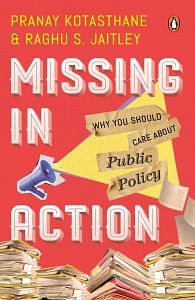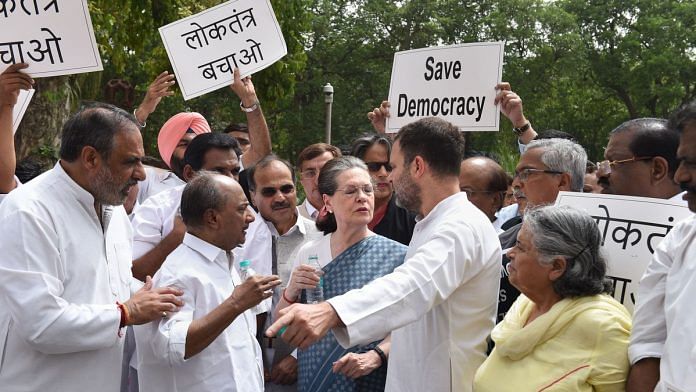Do we have a problem of too much democracy? In December 2020, a YouTube clip surfaced where the CEO of NITI Aayog was seen complaining about too much democracy in India. He later claimed he was misquoted. The usual brouhaha on social media followed. Memes appeared, Immanuel Kant was quoted, and Twitter had a field day.
To many Indians (especially the middle class), this was surprising. If you lived in India for long, you must have sometimes felt we have too much democracy. ‘Nothing moves in India because everyone has a say.’ ‘You can’t get anything worthwhile done because no one is willing to pay any short-term price for long-term benefits.’ ‘We elect goons and criminals because everyone has a vote.’ ‘Anything that’s good for the majority can be hijacked by a minority that’s vocal and organized.’ ‘We have all seen this. So, how can we outrage over the “too much democracy” comment when we know it is true?’
There are three aspects to consider while addressing this question. The first will clarify a few things about democracy and the State. The second part will be on the critique of democracy over the years. And at the end, we will talk about how despite everything, blaming ‘too much of democracy’ in the Indian context is meaningless.
To start with, democracy is a form of government—nothing more. There is an element of religious passion towards it by its adherents. This is particularly true in America and, possibly, stems from Walt Whitman, the poet of Democracy. Whitman elevated democracy to a mystical phenomenon. His poem ‘For You O Democracy’ (from Leaves of Grass, 1860 edition) is a hymn to it:
I will plant companionship thick as trees along all the
rivers of America, and along the shores of the great lakes,
and all over the prairies,
I will make inseparable cities with their arms about each
other’s necks,
By the love of comrades,
By the manly love of comrades.
For you these from me, O Democracy, to serve you ma
femme!
For you, for you I am trilling these songs.
It is difficult to top that. Democracy is an end to itself, and it must be valued with passion. Whitman’s spirit pervades the US polity to date. American exceptionalism over the last century has made democracy more than a mere form of government. It has come to be seen as an ideal for society. India too adopted not just a form of government following Independence, but this belief about the virtues of democracy, beyond a form of governance. This is one part of the problem.
But let’s start with its definition itself. Democracy may not even be an ideal form to choose who will govern the State. But like that quote often misattributed to Churchill, it is the worst form of government except for all the others. Broadly, it means everyone has a share of the government and the majority view prevails. This is understood to recognize that every citizen has an equal opportunity in creating the legislature that will govern them. The State that has the monopoly of legitimate violence over its citizens has multiple arms to conduct its affairs. Not every arm of it is democratic in nature like the legislature. We don’t elect our judges or our bureaucrats through popular mandate. In most cases, the process is designed to find the most qualified or the most appropriate person for the role instead of the most popular. Through an elaborate mechanism of checks and balances, these non-democratic institutions are subject to the will of the people. There are hardly any pure democratic institutions in any democracy.
Even the will of the people to determine the legislature isn’t democracy in its purest form. Most modern democracies are representative in their form. This is a recognition that the rule can never be directly of all people but of ‘typical members’ who represent them. It tacitly acknowledges that those who represent the people are better suited than others to ‘rule’. In that sense, every democracy still retains an element of aristocracy or the rule of the elite. It is important to remember here, this representative form of government while being partly elitist still can’t be replicated in other spheres of society. No firm or enterprise
can run on democratic principles. Nor can any team, guild,
or community.
We shouldn’t seek more democracy in society, probably striving for more inclusiveness and openness makes more sense. This means more forums to discuss and hear issues impacting the public in the normal course of governance than only during elections. A more transparent way of governing where the public has access to the decision-making process and the underlying trade-offs. The Scandinavian examples on democracy often quoted are not examples of better or deeper representation. They have succeeded in making the process of governing inclusive. Also, we should be striving for a better republic that strengthens the process of choosing the best representatives among the people who then wield the power of the State and use it to enhance the welfare of individuals.
There hasn’t been any shortage of criticism of democracy over the ages. And we aren’t including tyrants, despots, and dictators in this list. This is led by Plato and Aristotle who, it could be argued, lived in a society that was democratic (slavery notwithstanding). They viewed democracy as good in theory but difficult to put in practice. Aristotle clubbed democracy as a deviant constitutional form, clubbing it with tyranny and oligarchy. To him, the ultimate end of a State was neither to maximize wealth as oligarchs would believe, nor was it to promote liberty and equality in every public sphere, which is the aspiration of democrats. Instead, he argued, it was ‘good life’ that was the true end of the State. That requires a ‘middle constitution’ or a ‘mixed government’ of a numerous middle class that chooses a wise few to govern. If one were to be kind to Aristotle, the mixed constitution he bats for is the precursor to the modern republic.
Following the French and American revolutions in the late eighteenth century, the ideas of liberty and democracy were debated widely. Political philosophers from Ruskin, Carlyle, to Tocqueville were troubled by the exaggerated deference to the will of the majority. In their view, there was a qualitative difference among people and the idea to treat all of them as equal in their right to rule the State was terrible. The majority would be swayed by demagogues who would pander to their worst instincts, and the minority that was qualitatively better would lose the will to fight. James Bryce in Hindrances to Good Citizenship laid out the arguments of this school in detail. In a chapter entitled ‘The True Faults of Democracy’, he pointed out four flaws:
First, a certain commonness of mind and tone, a want of dignity and elevation in and about the conduct of public affairs, an insensibility to the nobler aspects and finer responsibilities of national life.
Secondly, a certain apathy among the luxurious classes and fastidious minds, who find themselves of no more specific account than the ordinary voter, and are disgusted by the superficial vulgarities of public life.
Thirdly, a want of knowledge, tact, and judgment in the details of legislation, as well as in administration, with an inadequate recognition of the difficulty of these kinds of work, and of the worth of special experience and skill in dealing with them. Because it is incompetent,
the multitude will not feel its incompetence, and will not seek or defer to the counsels of those who possess the requisite capacity.
Fourthly, laxity in the management of public business. The persons entrusted with such business being only average men, thinking themselves and thought of by others as average men, and not rising to a due sense of their responsibilities, may succumb to the temptations which the control of legislation and the public funds present, in cases where persons of a more enlarged view and with more of a social reputation to support would remain incorruptible. To repress such derelictions of duty is every citizen’s duty, but for that
reason it is in large communities apt to be neglected. Thus the very causes which implant the mischief favour its growth Fairly prescient there. The criticism of democracy remained
muted through much of the great wars of the twentieth century and the Cold War. However, the last twenty years have seen a revival of sorts. The question has been on new democracies that have sprung up without a fierce adherence to the notion of individual liberties. The earliest work on this was by Fareed Zakaria who in a piece titled ‘The Rise of Illiberal Democracy’ (Foreign Affairs, November 1997) wrote about the perils of democracy without the concomitant pursuit of liberalism. In an interview in 2017, Zakaria updated his warning about democracy:
The happy narrative we told ourselves was that there was an almost ineluctable path to liberal democracy, and the evidence suggests that this is not how it works. Liberal democracy seems to be one of the many exits on which the democratic experiment could end, but there are others, like illiberal democracy, that are equally likely.
It appears this is what’s happening in Turkey right now and in parts of Central Europe and in Russia. It’s important to remember that despite all the repression, Putin is very popular. What we’re learning is that authoritarian politicians have figured out how to achieve a balance between liberalism and illiberalism that keeps people satisfied. If they can give enough bread and circus to the public, they can maintain a stable working majority buttressed by a certain degree of repression of the press and political opposition.
And we have to reckon with the possibility that this model might become the most stable alternative to liberal democracy.
All of the above is not to suggest there’s a reason to applaud the lament of ‘too much democracy’ that springs among elite Indians. The reasons that have stymied India don’t have much to do with the perceived flaws of democracy. Like we have pointed out earlier, it has more to do with an overextended State that’s weak. Instead of being good in a few things (law and order, basic public services, and defence), the State has chosen to be bad in a lot of things.
 This excerpt from ‘Missing In Action: Why You Should Care About Public Policy’ by Pranay Kotasthane and Raghu S Jaitley has been published with permission from Penguin India.
This excerpt from ‘Missing In Action: Why You Should Care About Public Policy’ by Pranay Kotasthane and Raghu S Jaitley has been published with permission from Penguin India.



